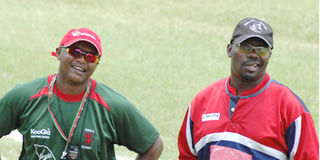Sports managers, stay true to Ayimba’s ideals in honour of the icon

National rugby sevens team head coach Benjamin Ayimba (right) and physio-trainer Geoffrey Kimani shares a light moment at during a break of their training session at RFUEA grounds in Nairobi in this undated file photo.
What you need to know:
- On that day, a semi-professional but thoroughly motivated Kenya Sevens rugby team dared to dream and shocked Fiji 30-7 in the final of Singapore Sevens to win the World Rugby Sevens Series tournament for the very first time
- Kenya made their opponents look ordinary on the day but in reality, Fiji Sevens are no pushovers
- Ayimba, who died at the age of 43 of cerebral malaria, played for Kenya Cup team Impala Saracens, played for both the Kenya Sevens and Kenya 15s teams
Former Kenya Sevens rugby coach Benjamin Ayimba who died on Friday will be remembered as a man who took chances that came his way.
We are often reminded that for one to win a lottery, he must first buy a ticket. Life is a game of chances, and in sports, chances don’t come bigger than playing in the final of a major tournament in which the title is minutes away.
Very few moments in Kenya’s sporting history come close to rivaling April 17, 2016 in popularity. On that day, a semi-professional but thoroughly motivated Kenya Sevens rugby team dared to dream and shocked Fiji 30-7 in the final of Singapore Sevens to win the World Rugby Sevens Series tournament for the very first time.
The late Benjamin Ayimba, considered Kenya’s most successful rugby coach, was in charge of the team. Kenya had set the tone for a dramatic final, beating Argentina 15-12 with the last kick of the ball in the semi-finals.
Collins Injera scored twice as Kenya collected 20 unanswered points in the first half against Fiji who went into the final as series leaders.
“Getting one over Fiji with more than 30 points is such a special feeling. We have been waiting for this moment. We have been seeing other teams win and sing their national anthems and saying maybe one day we will be there but finally it is here,” Injera who is second in the all-time top try scorers’ list summed up the joy in Kenya Sevens camp.
Injera even had time to demonstrate “selfie dance” to former New Zealand Sevens star-turned rugby commentator Karl Te Nana at Singapore’s National Stadium where some 45,000 fans had turned up for the final match.
While it did not match the score line, the result eclipsed Fiji’s 71-0 thumping of Kenya in the first round of 1998 Commonwealth Games, bringing Kenya a measure of revenge. Kenya made their opponents look ordinary on the day but in reality, Fiji Sevens are no pushovers.
Currently ranked third behind South Africa and leaders New Zealand, two-time Rugby World Cup Sevens champions Fiji have won the Hong Kong Sevens a record 12 times since 1976. Popular for its style of play that became known as “Fijian flair” in the World Rugby Sevens Series, Fiji is the only team in the world to have won the Sevens treble which is achieved by winning the Olympics, World Rugby Sevens Series and the Rugby World Cup Sevens.
Back at home, Kenyans were bubbling with joy.
“A brilliant, confident and powerful effort has earned #TeamKenya a richly deserved #Singapore7s victory. Hongera. Way to go! #Kenya7s,” President Kenyatta tweeted.
“Congratulations #Kenya7s for making history by winning the first ever World Series Cup title at the 2016 #Singapore 7s,” Deputy President William Ruto weighed in.
“Outstanding performance by Kenya Sevens. Flying the Kenyan flag high and proud,” Raila Odinga tweeted.
Days later, the sight of captain Andrew Amonde lifting aloft the trophy as he descended down the steps of the team’s aeroplane at Jomo Kenyatta International Airport brought joy in many Kenyan living rooms.
Well, coach Ayimba is no more but when the story of Kenya Sevens is told, a whole chapter will no doubt be spared for him for diligently carrying the hopes of our nation and delivering a first World Rugby Sevens Series tournament title for Kenya with a squad which had gone unpaid for five months due to financial challenges facing Kenya Airways which was the team’s sponsor at the time. That victory inspired a whole generation of rugby players in Kenya, and brought the nation together.
Politicians, rugby players, journalists, sports administrators, fans and friends have used colourful words to eulogise Ayimba, who was serving as the Kenya Rugby League Federation technical director at the time of his death.
Ayimba, who died at the age of 43 of cerebral malaria, played for Kenya Cup team Impala Saracens, played for both the Kenya Sevens and Kenya 15s teams.
He was appointed coach of Kenya Sevens team in 2006 while still playing for the national team.
While that put him in a unique position to understand the problems facing the team, it also put a huge responsibility on his shoulders of handling the challenges that come with the job. The best way for local sports administrators to remember Ayimba is to stay true to his ideals, and to serve sports diligently.





